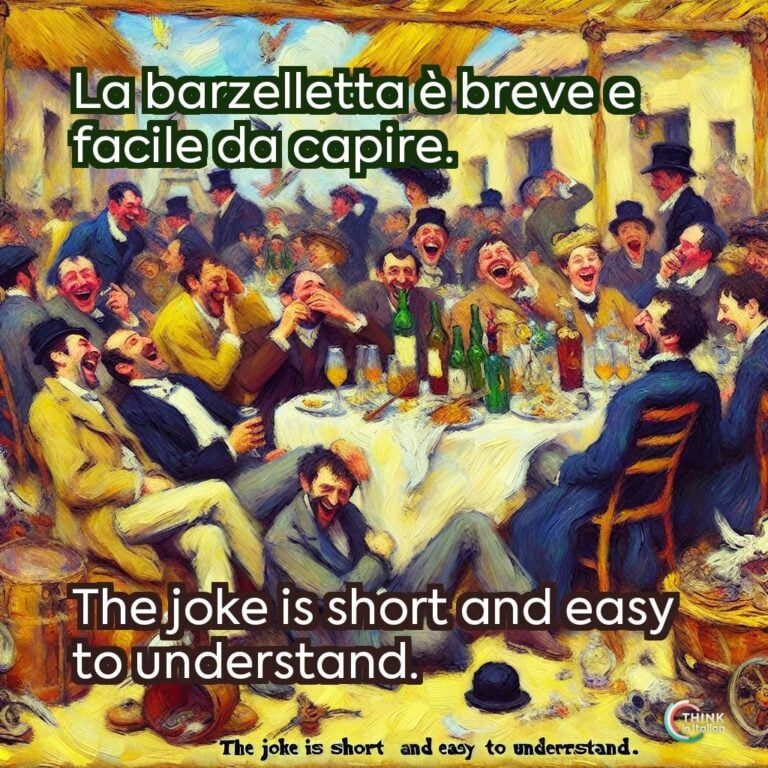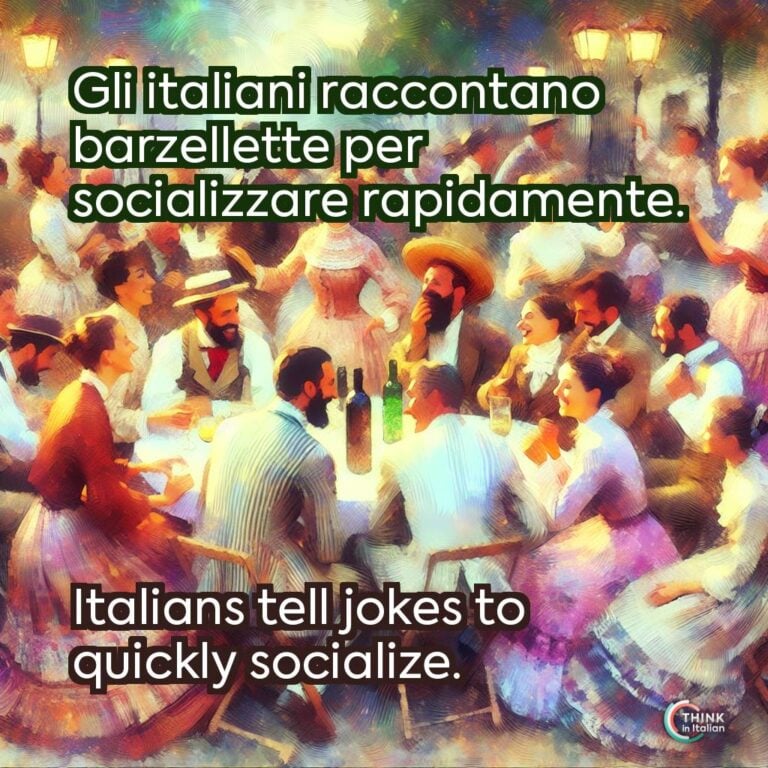Introduction to Italian Jokes
Italians’ Sense of Humor
Italians have a rich tradition of storytelling, and jokes are an important part of that tradition. They use humor to express themselves, get through challenging circumstances, and form relationships with others.
Humor is also used to make social commentary and critique authority. Italians value comedy and frequently use it as a means of social interaction.
Italian jokes are known for their clever wordplay, puns, and cultural references. The jokes can vary from brief one-liners to lengthy tales – barzellette – with surprising turns.
As a language enthusiast, I have always enjoyed learning about the culture and traditions of other countries, because they reflect language and are reflected in language.
For me, one of the most interesting aspects of Italian culture is Italians’ sense of humor, because it is both witty and charming, as well as deep and clever sometimes.
Common Italian Joke Structures and Themes
Italian jokes can be organized in a variety of ways, although some typical formats include puns, wordplay, colloquial idioms, and cultural references.
Topics also vary a lot: Italians love mocking their own culture and people, as well as themselves. Regional stereotypes, food, politics, religion, and sex are some of the most frequent topics.
The Importance of Learning Italian Jokes
Learning Italian jokes can be a fun and effective way to improve your language skills. Jokes are a great way to practice your vocabulary, grammar, and pronunciation. Also, they can help you learn new idiomatic expressions and cultural references.
Moreover, jokes can be a great icebreaker when you are trying to make new friends or practice your conversation skills. On the one hand, this will help you feel more comfortable when speaking Italian, while on the other hand, it will allow you to expand your network.
In fact, the best way to find a new Italian friend is to share a laugh with them. Trust me, make fun of an Italian person – respecting their boundaries and without being offensive – and you’ll have a new friend.
Italian Jokes Translated into English
Beginner Level
-Chi è l’elettricista italiano piu famoso?
-Lampa Dario!
-Who is the most famous Italian electrician?
-Lampa Dario!
This is an easy word pun: “Dario” is a typical Italian name, and “Lampa” might easily be a surname since we’re asking the name of the most famous Italian electrician.
However, lampadario all together means “chandelier”, which is liked to the profession of the electrician himself.
-Perché il libro di matematica era triste?
-Perché era pieno di problemi!
-Why was the math book sad?
-It had many problems!
The joke hinges on the double meaning of problemi, which can mean both “problems” (math problems) and “troubles” in a more general sense. This requires a bit of understanding of dual meanings in Italian, which is already doable for beginners.
Intermediate Level
-Perché il panettiere non ha problemi?
-Perché li-evita!
-Why does the baker have no problems?
-Because he avoids them!
The irony of this joke is in the double meaning of the answer: when writing it separately li evita means “(he) avoids them”, where “li” is a direct pronoun referring to i problemi (the problems).
When writing it all together, lievita means “it leavens”, namely the property of increasing in volume due to the effect of yeast fermentation.
-Com’è possibile che due sassi siano uguali?
-Sassommigliano!
-How is it possible that two rocks are the same?
-They look alike!
The irony lies in the answer, that is, “s’assomigliano” (they look alike) which, with the elision of the vowel “i”, becomes “sassomigliano”, practically creating the word “sasso” (stone). When you hear this joke, we immediately notice the similarity between words.
Advanced Level
-Dottore, ha qualcosa contro la tosse?
-No, no, tossisca pure!
-Doctor, do you have anything against the cough?
-No, no, cough!
Also in this case, the irony lies in the double meaning of the question: the first meaning is the logical translation of the patient asking if the doctor has any medicine to cure the cough.
However, when the doctor answers, the joke reveals a second interpretation: the expressions contro (against) might be interpreted as having anything against the cough, that is, whether it bothers him that the patient coughs.
Linguistically, the doctor responds with a formal imperative with “pure“, that can be translated as “no no, just cough!“, or rather: “it doesn’t bother me if you cough, you can cough peacefully!”
Effrazione allo spaccio di saponette, gli inquirenti se ne lavano le mani
Break-in at the soap shop, the investigators wash their hands of it.
This joke is a treasure trove of grammatical references: prepositions, phrasal verbs, and quite complex vocabulary.
“Lavarsene le mani” is a prepositional verb – phrasal verb – that has a very similar translation in English. However, its Italian structure is pretty difficult. It is a reflexive verb, as noticeable by the reflexive pronoun “si”, but it also makes use of an untranslatable pronoun “ne”.
In the joke, the wordplay lies in using the expression lavarsene le mani both in its literal sense (washing hands with soap, which ties back to the soap shop) and its idiomatic sense (to ignore responsibility).
Learn the Italian Language Through Jokes
It is now clear that exploring Italian jokes offers a delightful window into the Italian language and culture. Not only do these jokes provide you with entertainment, but they also enhance your Italian language skills.
In fact they can introduce you to idiomatic expressions, puns, and an overall understanding of Italian grammar. Whether you’re a beginner or an advanced learner, the humor found in Italian jokes can make your learning journey more enjoyable and engaging.
Also, jokes usually carry cultural references that reflect the unique charm of Italy. So, while laughing and learning, you’re also immersing yourself in the vibrant spirit of Italy.
So start honing your Italian puns and get ready to belly laugh!






